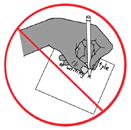The “Tones on words” concept is something we don't have in our occidental languages. Thus, we have difficulties applying tones, and somehow, we don’t get it when Chinese people don’t understand us if we mistake tones. But what are tones exactly? They are a kind of dictatorial language rule: a mistake completely isolates you and you cannot afford your voice to go out of bounds. There is nothing like the frustration you feel when you give your best pronunciation and nobody hears you. Moreover, you lol it so hard when you notice that Chinese people cannot whisper or shout because of the tones. You cannot mumble even when saying “hello”. Since I can observe 50 Chinese learners here in Dalian, I found out why most of us have the tones wrong. In most languages we speak, we don't spend more than half a second pronouncing each syllables of a word. However, you can barely apply a tone in half a second. Consequently, as long as we don't practice our syllable lengthening, we'll hardly acquire a good pronunciation.
There are five tones in the spoken Chinese language, illustrated by the following famous chart:

The fifth tone is our normal pronunciation I guess (I don’t even know where I am anymore). The tones are clearly written in Pinyin (Chinese written in Latin alphabet), but I can rarely catch them in Hanzi (Chinese characters). Why should we pay so much attention to tones? Because in mandarin Chinese, the tones are as important as the sound for determining the meaning of a word. Have an example:
Let’s take the word ma, the example you see the most:
 maThis ma stands for the question mark. You just place it at the of your interrogative sentence. Remember, as you are stuck by the tones, you cannot modify your tonality to mark a question, so our guys created the ma word.
maThis ma stands for the question mark. You just place it at the of your interrogative sentence. Remember, as you are stuck by the tones, you cannot modify your tonality to mark a question, so our guys created the ma word. māThe first toned ma means mother (māmā actually). You may have noticed the character is made of two shapes. The first character, the one on the left, is the key for "female". It gives you a trick to easily find the meaning if you see it written somewhere. You get to find the trick to remember the shape of the "female" character. Yeah, this is what Chinese writting & reading is all about: tips & tricks. If I am drunk enough someday, I'll blog my tricks for keys for you guys to understand how my brain is done and, moreover, how fucked up it is.
māThe first toned ma means mother (māmā actually). You may have noticed the character is made of two shapes. The first character, the one on the left, is the key for "female". It gives you a trick to easily find the meaning if you see it written somewhere. You get to find the trick to remember the shape of the "female" character. Yeah, this is what Chinese writting & reading is all about: tips & tricks. If I am drunk enough someday, I'll blog my tricks for keys for you guys to understand how my brain is done and, moreover, how fucked up it is.
mǎ
The third toned ma means horse. No key, just horse, since there are no additives, should we consider this is the original character? If we do so, something may have inspired Chinese people. At first, this character probably had a horse shape, than evolved. Brains, warm up, imaginations, wake up. Try to find the horse shape and comment me your drawings.
In case you still don't get the importance of tones, let me give you a hint: you don't want to call your mother a horse do you?
We are done with ma. Actually, I am done with it. I exposed three tones, there are still two more. It is enough for the following translation exam though.
Nǐ māmā shì mǎ ma?
Alright dear reader, I'll give something I haven't decided yet to the first non-Chinese who sends me the english translation of this sentence. I'll give something even more something to my reader who sends me the answer to this question, written in both, pinyin and hanzi. Two clues: Nǐ means "you" and shì means "to be".
Tones are hard, I confess. But what about the writing? Soon...















